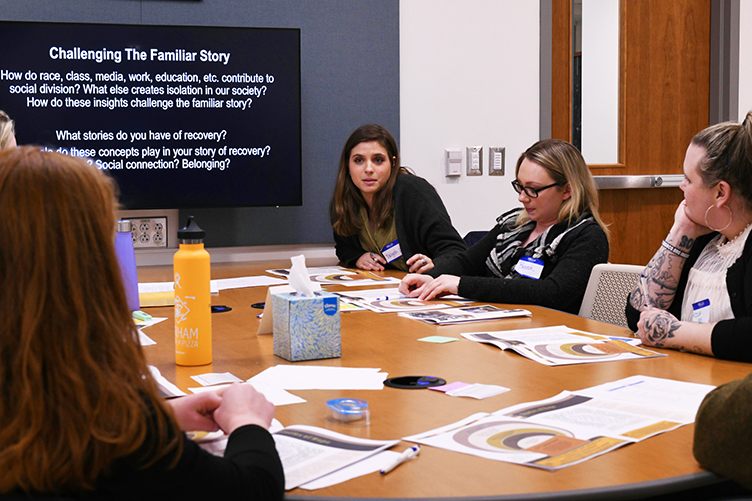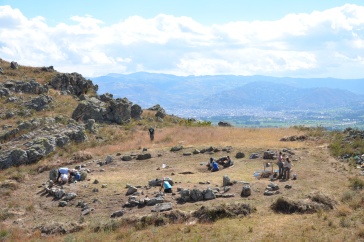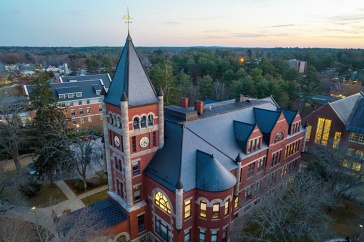
Students participate in a dialogue about opioid addiction, a program held in 2019.
We live in an age of protest and political polarization, and while Renee Heath and Jennifer Borda believe that protests have their place in society — “Sometimes, protests are the only way some people feel their voices can be heard,” says Heath, principal lecturer and co-director of the UNH Civil Discourse Lab (CDL) — their work at UNH focuses on what happens after the protests. “We’re interested in what happens when people on all sides of difficult issues gather around the table and work through some kind of resolution,” says Borda, associate professor of communication and CDL co-director.

This is more easily said than done at a time when society has polarized across social and political lines to an extent that they often appear to speak entirely different languages. In 2018, Heath and Borda created the CDL to strengthen the ability of students and community members to conduct meaningful conversations, collaborate and weigh decisions around sometimes difficult, but important, topics to a civil society. Although it has operated largely in the middle of a global pandemic, the CDL has engaged hundreds of students and many members of the community on subjects such as climate change, addiction and immigration.
Students interested in developing communication skills and participating in community discussions can follow a well-integrated program that teaches them about dialogue and group dynamics, trains them in notetaking and facilitation, and sets them loose to facilitate an actual event in the community. Students learn from faculty members such as Heath and Borda, but also from classmates who have gone through the training and advanced to leadership roles with the lab.
One such student leader was communication major Jake Garner ’20 whose work in the CDL earned him the 2020 Distinguished Service Award in the Department of Communication. Garner describes working with the CDL as one of the best decisions he made at UNH. “I would create marketing material to market CDL events, which I would then use to promote and convince people to attend. Today, I’m an event marketing specialist for Ryobi Outdoor Power Equipment and cannot think of a single thing I learned at the CDL that doesn’t correlate to what I’m doing day to day in my career.”

Borda says that highly motivated students can be up and facilitating within the span of a single semester, though it usually takes students a bit longer. “We found that despite our highly polarized climate, college students with little training and only minimal experience participating in dialogues could successfully facilitate a conversation on a topic like addiction that included people with a diverse set of views,” notes Borda.
The combination of research, experiential learning and praxis is something the directors call “pracademics,” a term that connotes an academic who is also an active practitioner in a subject area.
“...the goal is to keep deliberating, and we can’t do that without being civil.”
CDL pracademics are indeed grounded in research, such as a recent article the pair published called “Reclaiming Civility: Towards Discursive Opening in Dialogue and Deliberation,” in the Journal of Deliberative Democracy. (Read it here.) Their paper argues for a middle way between politeness and calling out that emphasizes mutual respect, listening over name calling or stereotyping, and openness to mutually interrogating the language we use to voice an opinion about something. “There are two extremes going on right now, in academic writing as well as society,” says Heath. “On one side are those who crave civility and conversation but realize that dialogue is impossible without civility. On the other side are those who feel they haven’t received justice and believe that civility is code for shutting down dissent. Our contention is that the goal is to keep deliberating, and we can’t do that without being civil,” Heath explains.
In place of both politeness and polarization, the authors call for the creation of two conditions that will govern any dialogue and deliberation. The first is a set of ground rules on how to agree to disagree without shutting down the conversation. The second is a commitment to allow participants to determine the meanings of “contested language” with each other and thus, in theory at least, learn to speak the same language, while eliminating epithets and other hurtful words and phrases. The result would be respectful dialogue and deliberation.
“This isn’t just theoretical,” says Heath. “We’ve seen it work in actual settings.”

For example, at the lab’s 2019 Stories and Voices forum on opioid addiction held on campus, Heath and a group of CDL student leaders facilitated a conversation about addiction that included police chiefs, social services workers, people who had been through recovery centers themselves and members of the Governor’s Taskforce for Addiction. One student facilitator, Piper Gibson ’21, from Colebrook, Conn., used Heath’s and Borda’s idea of “contested language” to open up a conversation about the potential harm of using the word “addict” to describe people with opioid addiction. “While many people think the word is pretty straightforward, it actually carries a strong, and often negative, set of connotations,” says Gibson. “These can not only be hurtful, they can also prevent people from understanding addiction from the perspective of those addicted, which is important if we are to uncover solutions for it. This was one of many important findings that came out of that day.”
Police Chief Dave Mara must have agreed with Gibson, for he submitted the final report from the UNH-community forum to the state Task Force on Opioid Addiction. As for Gibson, well, in the fall of 2021, she is taking her facilitation talents to the UNH School of Law where she will study public interest law and a future career advocating for those living with disabilities. Says Heath of one the lab’s star alums, “Piper is just one example of many of our alums who are taking their dialogue, collaboration and organizing skills, in the context of diverse settings, into 21st century workplaces that need them.”
-
Written By:
Dave Moore | Freelance Writer
















































